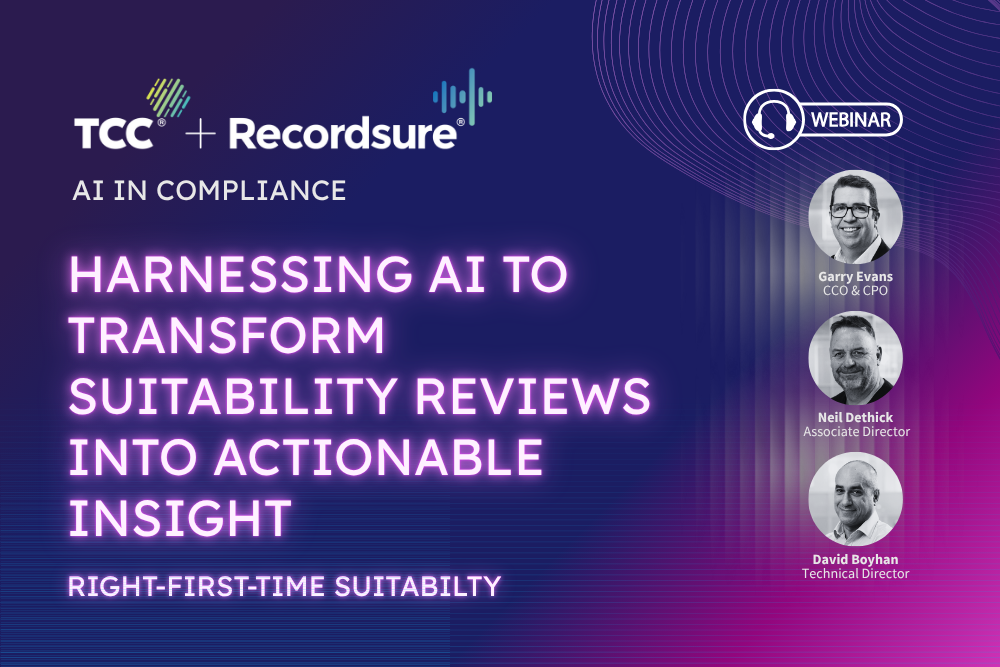During our first ‘AI in compliance’ webinar last week, TCC’s Operations Director, Neil Dethick, turned the spotlight on a familiar challenge within wealth management - how to extract truly meaningful Management Information (MI) from suitability reviews.
Despite their potential, these reviews often fail to deliver the insight firms need to drive real improvement in compliance and advice quality.
Attendees were asked how confident they were that their current file review processes provide MI capable of accurately identifying key findings, themes and trends to support meaningful root cause analysis. While a small fraction of respondees felt extremely confident in the insights their processes delivered, the majority were only somewhat confident, and a notable minority admitted to having little faith at all. This snapshot underscored a familiar industry challenge: many firms struggle to turn file reviews into actionable intelligence that drives real improvements.
Balancing quality and cost
Yet amidst these challenges, some firms are already operating at a higher level – Neil’s analogy to a “Marks and Spencer” approach to suitability reviews perfectly captured this balance. High-quality outcomes are achievable, but traditionally they come with increased time and cost. For compliance teams, this trade-off has often been a limiting factor. The question then arises: is it possible to deliver higher-quality suitability reviews without inflating costs or slowing down processes?
The answer as discussed during the webinar, called out the importance of harnessing AI. By embedding AI at both the front and back end of the file review process, organisations are seeing dramatic efficiencies. At the front end, AI can help with the labour-intensive work of sorting and prioritising documents, filtering by date and relevance and presenting the reviewer with the key facts. Know-your-customer (KYC) information, product performance data and client discussion themes such as risk appetite or previous investment experience can all be surfaced instantly. This allows human reviewers to focus exclusively on what AI cannot replicate such as nuanced judgment about whether the advice provided is genuinely suitable.
Driving evidence and reporting
Simultaneously, the right kind of AI can build an evidence support pack, signposting the adviser to the specific documentation underpinning each suitability aspect. This ensures clarity and accountability while driving detailed reporting and MI generation. Themes and trends are identified early, key issues are addressed before they escalate and remedial actions can be recommended swiftly. For compliance leaders, real-time dashboards and instant feedback are no longer a pipe dream, they are operational realities.
Driving evidence and reporting
While the FCA has positioned the scheme as straightforward and automatable, the underlying data tells a different story. The regulator’s own estimates suggest operational costs of £2.8 billion, excluding the redress payments themselves – equating to roughly £240 per agreement for the 11.7 million customers thought likely to opt in o the redress scheme.
This scale highlights the multifaceted nature of the work involved. Automation may handle a portion of the redress calculations but manual intervention will still be needed across key stages such as legacy data retrieval, validation, tracing customers, handling deceased estates and managing those cases where collections and/ or enforcement activity was involved. Firms will need flexible and auditable systems, scalable resourcing models and strong governance to maintain accuracy and fairness throughout the process.
Benefits that make a real difference
The results of this approach are providing striking results. When leveraged by the TCC Managed Services team, average handling times for file reviews have been cut by over 40%, directly reducing costs. In turn, advisers receive highly accurate and specific feedback, improving standards and outcomes.
Human judgment remains essential
Despite these advances, AI is a powerful enabler, not a replacement for human judgment. Non-human suitability reviews remain years away. The ideal model blends human expertise with AI efficiency, leveraging technology to elevate and not replace the nuanced decision-making that underpins effective financial advice.
AI as a strategic lever
Recordsure’s AI which is utilised by TCC’s experts is not just a tool for compliance efficiency; it is a strategic lever. When applied, it allows firms to deliver higher-quality reviews, extract actionable insights and continuously raise the bar on advice standards – all without incurring prohibitive time or cost.
By rapidly processing and analysing advice documentation, Recordsure AI helps firms maintain compliance with confidence, flagging missing evidence and streamlining workflows for advisers. With proven results across millions of documents, it allows your team to focus on high-value decision-making while AI handles the heavy lifting of review, reporting, and evidence management.
Book your complimentary ‘business-as-usual’ analysis today and let our experts:
- Review up to 100 client files from 2025
- Deliver a deep-dive, TCC-led compliance analysis
- Provide an actionable MI pack and report
- Present findings in a board playback session




